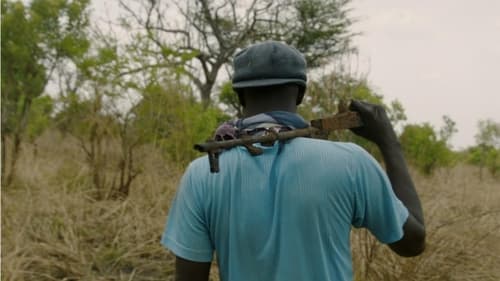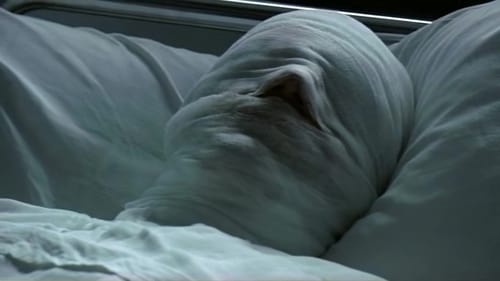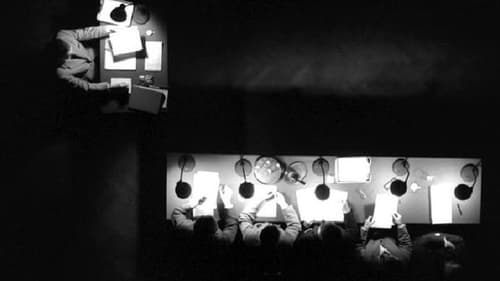Kempinski (2007)
Kempinski is a mystical and animist place. People emerge from the dark, holding fluorescent lamps; they speak about a magical world.
장르 :
상영시간 : 14분
연출 : Neil Beloufa
시놉시스
Kempinski is a mystical and animist place. People emerge from the dark, holding fluorescent lamps; they speak about a magical world. “Today we have a space station. We will launch space ships and a few satellites soon that will allow us to have much more information about the other stations and other stars.” Their testimonies spark confusion and contradiction: a second reading is necessary to fully understand what is going on in this unique blend of fiction (sci-fi) and ‘real’ documentary. The scenario of ‘Kempinski’, filmed in various towns in Mali, is defined by specific rules: interviewed people imagine the future and speak about it in the present tense. Their hopeful, poetic and spiritual stories and fantasies are recorded and edited in a melod…

In 1991, when images of the Gulf War flooded the international media, it was virtually impossible to distinguish between real pictures and those generated on computer. This loss of bearings was to change forever our way of deciphering what we see. The image is no longer used only as testimony, but also as an indispensable link in a process of production and destruction. This is the central premise of "War at a Distance", which continues the deconstruction of claims to visual objectivity Harun Farocki developed in his earlier work. With the help of archival and original material, Farocki sets out in effect to define the relationship between military strategy and industrial production and sheds light on how the technology of war finds applications in everyday life.


Uganda, 1989. A young Acholi rebel guided by spirits, Joseph Kony, forms a new rebel movement against the government: the LRA, The Lord’s Resistance Army. An “army” that grew by abducting teenagers – more than 60 000 over 25 years – of which less than half came out of the bush alive. Geofrey, Nighty and Mike, a group of friends, as well as Lapisa, were among these youths, abducted at 12 or 13. Today, in their effort to rebuild their lives and go back to normal, they revisit the places that marked their stolen childhood. At the same time victims and murderers, witnesses and perpetrators of horrific acts that they did not fully understand, they are forever the "Wrong Elements" that society struggles to accept. Meanwhile, in the immensity of the Central African jungle, the Ugandan army still continues to hunt the last scattered LRA rebels. But Joseph Kony is still out there, on the run.

La part de l’ombre recovers the life of the Hungarian photographer Oskar Benedek, who disappeared the day his exhibition opened; what happened to him? - IndieLisboa

In 'As You See', Farocki searches for those instances and facts in the history of technology that have been overlooked or ignored, also exploring the ambivalent relationship between technologies developed for civil use and those designed for military purposes. Thus the film for instance describes how in the 1970s workers at the British arms factory Lucas Aerospace attempted to develop socially useful products to replace the company's military output. Rather than following a linear argument, this essay-film juxtaposes disparate images and weaves them into a mosaic-like structure which makes it possible for the viewers to make their own connections between the different images as well as between the images and the commentary.

Portrait of youths in an abandoned amusement park in Casablanca, in meaningful tableaus inspired by social media. "I am here, I exist."

An old man is kidnapped. His interrogation uncovers the biography of a mass murderer: The 80 years old man was a SS leader and responsible for the killing of thousands of people in Russia. He also "invented" an evil technique of eliminating political prisoners: the manipulated suicide. Thomas Harlan reconstructs the history of a bureaucratic murderer, he also develops a direct connection between the Nationalsocialism and the treatment of prisoners of the RAF terrorists in the Stuttgart isolation prison. Robert Kramer filmed the shooting of Harlan's Wundkanal: Notre Nazi documents a social experiment in which the children of Nazis and of victims meet a real culprit. The reality seems to be stronger that the fiction in Harlan's film. (Edition Filmmuseum)

In an impressive follow up to his debut film Forest, Benedek Fliegauf tells the uncompromising story of a day in the life of a drug dealer. His clients include the leader of a religious sect, a friend who needs a final fix, a former lover who has had his child, a student, and a black marketeer. Fliegauf's film recreates life in a city that resembles a ghost town, an alienated world with its own priorities and realities. It is, he says '. an imaginary city with a strongly spiritualist atmosphere. This necropolis is the film's real protagonist'.

A film composed of images from prisons. Quotes from fiction films and documentaries as well as footage from surveillance cameras. A look at the new control technologies, at personal identification devices, electronic ankle bracelets, electronic tracking devices.

According to Harun Farocki, today's photographers working in advertising are, in a way, continuing the tradition of 17th century Flemish painters in that they depict objects from everyday life - the "still life". The filmmaker illustrates this intriguing hypothesis with three documentary sequences which show the photographers at work creating a contemporary "still life": a cheese-board, beer glasses and an expensive watch.

Directed by Armand Gatti

In Our Nazi, we are plunged into a situation we barely, and only slowly, understand: the filming of Thomas Harlan’s experimental feature Wundkanal (1984), in which true-life ex-SS officer Alfred Filbert, now very old, is ‘put on trial’ for the camera, without him suspecting what is to come or why he is really there. Kramer’s confronting film is an essay about the sticky complicity of everyone present at this event, each bringing their own history, their own political ideology, their own desires to take revenge, to seek redemption or compassion, or just to put their heads down and ‘get the job done’ professionally, or (in the case of Filbert) to be a star, a part of the magnificent, magical, seductive world of cinema, even if it kills him.

Tourneur, a self-proclaimed cinéaste, feuds with Cinema and his gang, who are obsessed with foreign action movies.

Feature-documentary "pointing up a thousand facets of this world and probing to determine what may lie beneath the surface".

At the height of Reign of Terror Maximilien Robespierre orchestrates the trial and execution of several of his fellow leading French revolutionaries including Georges Danton.

The film covers a hundred years in the lives of the Ricordi family, the Milan publishing house of the title, and the various composers and other historic personalities, whose careers intersected with the growth of the Ricordi house. It beautifully draws the parallel between the great music of the composers, the historic and social upheavals of their times, as well as the "smaller stories" of the successive generations of Ricordi.

A documentary essay about the relationships among Mediterranean men and their games. The film takes the form of a travelogue across Croatia, Italy, Slovenia and Turkey, and examines men, young and old, who come together like their ancestors did – to play games. During filming, however, the director suddenly faces a serious creative crisis and turns the camera on himself, turning the film into a playful homage to absurdity.

Universal Hotel combines objective and subjective elements. In it, Thompson chronicles his research into experiments by Dr. Sigmund Rascher at Dachau in 1942, in which he nearly froze a Polish prisoner and then got a German prostitute to warm him up; Thompson uses photographs from archives in six countries and recounts a subjective dream set in what he calls the Universal Hotel.







